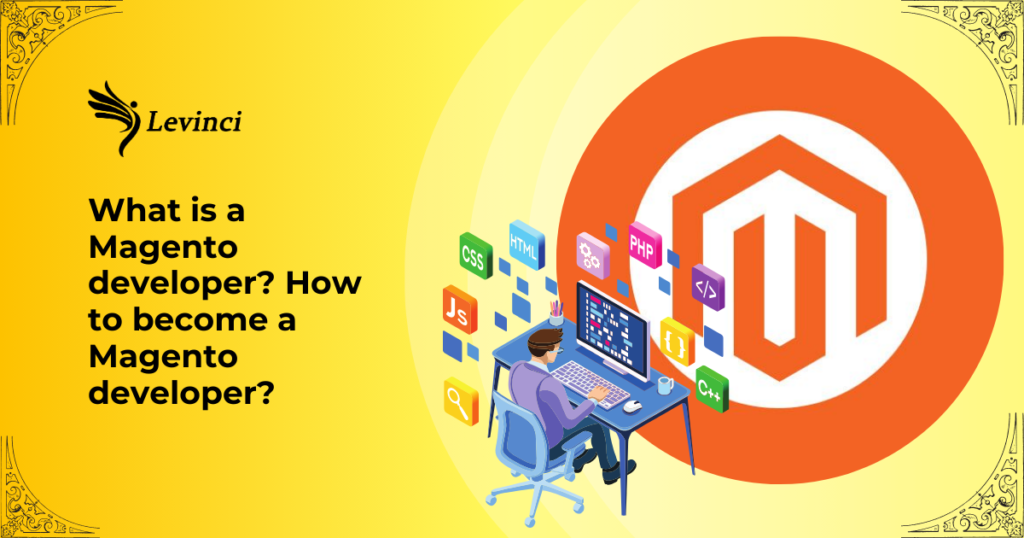Becoming a Magento developer opens the door to a world of e-commerce opportunities, allowing you to build powerful, scalable online stores. But What is a Magento developer and how to become one? Let’s find out with Levinci now!
What is a Magento developer?

Magento is an open source application to build e-commerce websites. Magento uses the PHP programming language and is based on the Zend Framework platform. Magento is a popular open-source platform that allows businesses to create online stores.
A Magento developer is a web developer who specializes in building, maintaining, and improving websites using the Magento e-commerce platform to create e-commerce websites that suit project needs and customer requests.
What do Magento developers do?
Magento developers are the architects of the online shopping experience. They specialize in using the Magento platform to build, customize, and maintain e-commerce websites. Their skillset bridges the gap between web development and the world of online commerce. Here’s a glimpse into what Magento developers typically handle:

- Crafting E-commerce Websites: This involves setting up the Magento platform from scratch, designing the storefront’s visual appeal, and integrating essential features for a smooth shopping experience.
- Custom Feature Development: While Magento offers a rich set of built-in features, businesses often require unique functionalities. Magento developers create custom extensions to fulfill these specific needs such as payment gateway integration, shipping services, etc.
- Website Maintenance and Updates: Magento websites require ongoing maintenance to ensure security, functionality, and that they’re up-to-date with the latest advancements. Magento developers keep these stores running smoothly.
- Troubleshooting Issues: If any problems arise with the Magento website, Magento developers diagnose and fix them, ensuring a seamless user experience for customers.
Some main types of Magento Developers
The world of Magento development offers various specializations, each with its own focus. Here’s a breakdown of some common types of Magento developers:
Front-End Magento developer
Front-End Magento Developers are ”the artists” of the Magento world. They focus on the visual and interactive aspects of the e-commerce website. They are proficient in HTML, CSS, JavaScript, and specific Magento theme components.
They collaborate with UX/UI designers to translate design concepts into functional and visually appealing storefronts. Their primary mission is to create a user-friendly shopping experience, ensuring websites are aesthetically appealing across a variety of devices.
Back-End Magento developer
Back-End Magento Developers are the engineers behind the scenes. They handle the server-side aspects that power the e-commerce store. They ensure smooth functioning by managing the databases that store product information, customer data, and other vital details.
Full-Stack Magento developer
Full-stack Magento developers are the jacks-of-all-trades, wielding expertise in both front-end and back-end development, making them invaluable assets for any e-commerce project. They are capable of handling the entire gamut of Magento development tasks, from theme customization and extension development to system integration and database optimization.
Imagine a developer who can seamlessly craft the captivating storefront that entices customers and then dive under the hood to ensure the robust engine that powers the entire shopping experience functions flawlessly.
Magento Extension developer
Magento extension developers specialize in creating extensions, which are essentially mini-programs that add new features or enhance existing functionalities on a Magento store. These developers have a deep understanding of Magento’s architecture and coding standards, which allows them to build extensions that are reliable and safe to upgrade.
Magento Solution Specialist
Magento Solution Specialists are a unique breed within the Magento ecosystem. They’re not just your average developers; they’re strategic consultants who bridge the gap between business needs and the technical capabilities of the Magento platform.
Unlike developers who delve deep into the technical aspects, Magento Solution Specialists possess a strong understanding of e-commerce business models, challenges, and opportunities. They can analyze a business’s needs and goals from a commercial perspective.
They can leverage their Magento expertise to recommend the best approach, whether it’s utilizing existing Magento features, customizing them, or developing custom extensions that align perfectly with a business’s specific requirements. Furthermore, they often oversee project management, advise on best practices, and ensure that the final product meets quality standards.
How to become a Magento developer?

Building the Foundation
First, build a solid educational foundation such as a bachelor’s degree in computer science, information technology or a related field. This will help you gain basic knowledge of programming and web development. In particular, take courses related to PHP, JavaScript, and database management because Magento depends heavily on these technologies.
Additionally, consider Magento-specific courses or certifications, such as Adobe’s Certified Magento Commerce Developer certification, to demonstrate your professional skills and commitment to potential recruitment.
Develop Technical Magento Skills
Focus on cultivating in-depth knowledge of PHP, the main languages used in Magento and familiarizing yourself with other relevant technologies such as HTML, MySQL, JavaScript and CSS.
As Magento is built on PHP, competency in this language is paramount. You need to understand core PHP concepts, object-oriented programming, and working with databases will be instrumental.
At the same time, you should learn about Magento’s architecture, including its theme and templating systems, extension development, and customization techniques. Practice by setting up your own Magento environment and testing different features and modules.
Gaining Practical Experience
Theoretical knowledge is valuable, but practical experience is essential for solidifying your skills. You can gain practical experience by:
- Develop Personal Projects: Build your own Magento store as a practice project. This allows you to experiment, explore different functionalities, and gain practical experience in building and customizing a Magento website.
- Contribute to Open-Source Projects: The Magento community thrives on open-source contributions. Look for opportunities to contribute to existing Magento projects on platforms like GitHub. This not only enhances your skills but also allows you to learn from many experienced developers.
- Freelancing or Internship: Consider freelance work or internship opportunities with Magento development agencies or e-commerce businesses. This provides real-world experience working on client projects and tackling diverse challenges.
Create an portfolio
As you gain experience, compile a portfolio showcasing your Magento projects. Include details about custom modules you’ve developed, themes you’ve designed, or complex problems you’ve solved. A well-documented portfolio can highlight your technical abilities, problem-solving skills, and contribution to successful e-commerce solutions, making you a more attractive candidate for employers.
Continuous Learning
The world of technology is ever-evolving, and so is the Magento platform. Stay updated with the latest knowledge by following official announcements, new feature releases, and best practices by following Magento’s community forums and blogs, or attending conferences and meetings to expose yourself to industry trends.
Conclusion
The path to becoming a Magento developer is a rewarding journey that requires dedication, continuous learning, and a passion for e-commerce. Building a strong foundation, and actively seeking opportunities to learn and practice, you’ll be well on your way to establishing yourself as a successful Magento developer.

